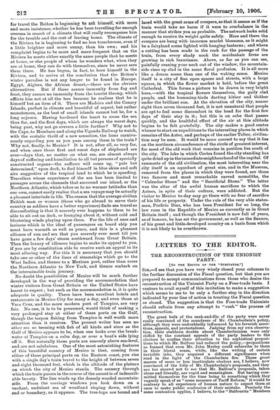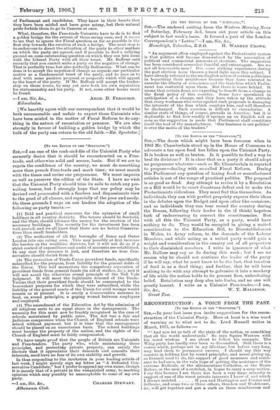LETTERS TO THE EDITOR.
THE RECONSTRUCTION OF THE UNIONIST PARTY.
[TO TIM EDITOR OF THE *SPECTATOR:1
see that you have very wisely closed your columns to the further discussion of the Fiscal question, but that you are prepared to accept communications from those who desire the reconstruction of the Unionist Party on a Free-trade basis. I venture to avail myself of this invitation to make a suggestion which seems to me to be only a further step in the direction indicated by your line of action in treating the Fiscal question as closed. The suggestion is that the Free-trade Unionists should refrain from any attempt to "rash" the process of reconstruction.
The great bulk of the rank-and-file of the party were never really convinced of the soundness of Mr. Chamberlain's policy, although they were undoubtedly influenced by his feverish asser- tions, appeals, and protestations. Judging from my own observa- tion, their stubborn doubts about Chamberlainism were only stifled by the constant appeals of the party leaders to the electors to confine their attention to the sophistical proposi- tions to which Mr. Balfour had reduced the policy,—propositions so framed that even Mr. John Morley could subscribe to them in their literal sense, while, like the writing of certain invisible inks, they acquired a different significance when read in the light of the Chamberlain fire. These great masses of more or less inarticulate electors are, I believe, now convinced of the folly of Mr. Chamberlain's proposals, and they are too shrewd not to see that Mr. Balfour's proposals, taken alone and literally, are vapid and meaningless. But having com- mitted themselves for the time being to something which they vaguely speak of as "some measure of Tariff Reform," it would be contrary to all experience of human nature to expect them at once to make public confession of their mistake. Precisely the same contention applies, I believe, to the " Balfourite" Members
of Parliament and candidates. They know in their hearts that they have been misled and have gone astray, but their natural pride forbids them to go to Canossa at once.
What, therefore, the Free-trade Unionists have to do is to find a golden bridge for the retreat of those erring ones, and it seems to mo that to ignore the Fiscal question as far as possible is the first step towards the erection of such a bridge. The next step is to endeavour to direct the attention of the party to other matters on which the party are agreed, and if possible to find a rallying
, ground on some outstanding question on which they can join issue with the Liberal Party with all their heart. Mr. Balfour said recently that you cannot unite a party on the negation of change. That is perfectly true, but also perfectly Balfourian. What can be done is to accept the negation of change as regards one particular matter as a fundamental tenet of the party, and to pass on to deal with some positive proposal or proposals which will appeal to the heart of the party. If Mr. Balfour will accept the leader- ship on those terms, he may yet save both his own reputation for statesmanship and his party. If not, some other leader must be found.
[We heartily agree with our correspondent that it would be both unreasonable and unfair to expect those Unionists who have been misled in the matter of Fiscal Reform to do any- thing in the nature of recantation or penance. We are also strongly in favour of building a golden bridge by which the bulk of the party can return to the old faith.—En. Spectator.]











































 Previous page
Previous page